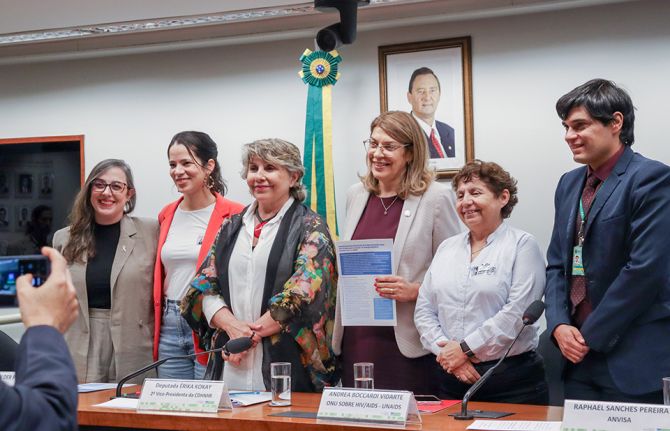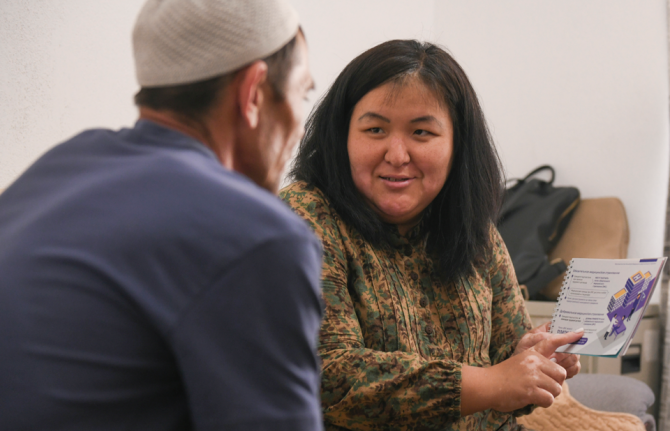
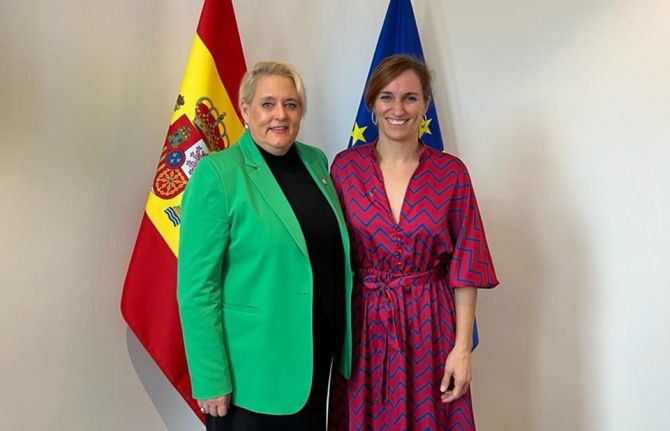
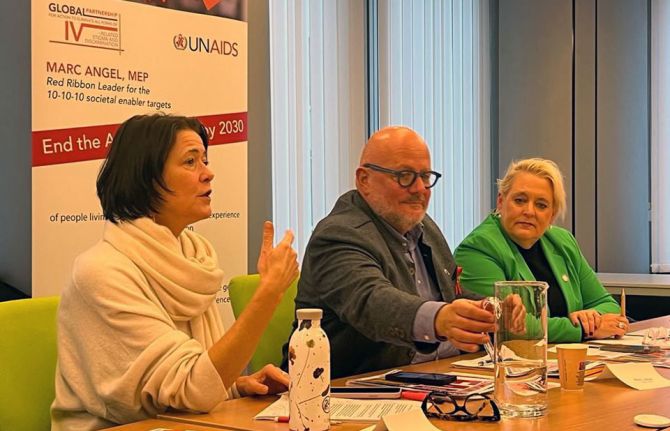
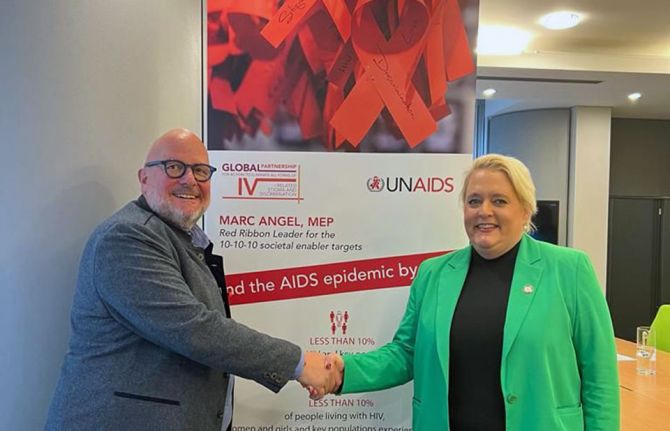
Press Statement
On World AIDS Day, UNAIDS, the European Union and partners call for an end to HIV-related stigma and discrimination
01 December 2023 01 December 2023BRUSSELS, 1 December 2023—On World AIDS Day, UNAIDS, Spain, as President of the Council of the European Union, and other partners called for the elimination of all HIV-related stigma and discrimination as a necessary step towards ending the AIDS pandemic as a global public health threat by 2030.
Speaking at the event held at the European Parliament in Brussels, Spain’s Minister of Health, Mónica García, re-affirmed Spain’s commitment to achieve zero HIV-related stigma and discrimination.
“We hope that this leadership of Spain for the elimination of all forms of stigma and discrimination associated with HIV will be maintained over the next 7 years to meet our goals by 2030,” said Ms Garcia.
The elimination of HIV-related stigma and discrimination has been a political priority of the Spanish Presidency of the Council of the European Union since July 2023. This was reflected in a high-level meeting on "HIV and Human Rights: Political Action to Achieve Zero Stigma" hosted by the Spanish Ministry of Health in September 2023 in Seville. At the event, Spain took the important step to officially join the Global Partnership for action to eliminate all forms of HIV-related stigma and discrimination, becoming the second EU country to join after Luxembourg.
At the event in Brussels, UNAIDS Deputy Executive Director, Christine Stegling, thanked Spain for its leadership globally and in the European Union and said the world needed to act urgently to eliminate HIV-related stigma and discrimination.
“We’ve made impressive progress against HIV, but we have much work left to do,” said Ms Stegling, “Unless we succeed in ending AIDS-related stigma and discrimination, we will not be able to reach everyone in need. Stigma and discrimination against people most affected by HIV are the biggest barriers to accessing lifesaving HIV prevention and care. We look forward to working with European Union Member States, the European Parliament and the Council of the European Union, to take this agenda forward."
As Spain steps down from its Presidency of the Council of the European Union at the end of December 2023 and as Belgium assumes the role, Ms. Stegling also expressed hope that Belgium will follow in Spain’s footsteps and continue to lead on this critical issue. She called on the whole of the European Union to join in global efforts to abolish AIDS-related stigma and discrimination to reach people who are currently being left behind in the response.
Around the world, some 9.2 million people living with HIV still do not have access to life-saving medicines. Every minute, a life is lost to AIDS. In 2022, 1.3 million people became newly infected with HIV. Many people most affected by HIV are being left behind, including adolescent girls and young women, gay men and men who have sex with men, people who inject drugs, sex workers and migrants. These are the people who must be reached for AIDS to be ended as a public health threat by 2030.
Removing AIDS-related stigma, discrimination and criminalization will make it more possible to reach those currently being left behind. Political leadership in the European Union is key to achieving that goal.
Also critical for removing AIDS-related stigma and discrimination is community leadership. Ms. Stegling highlighted UNAIDS’ 2023 World AIDS Day report “Let Communities Lead” citing the need for governments and donors to fully empower and fund community leadership in the response to HIV.
Other speakers at the event included: Andrea Ammon, Director of the European Centre for Disease Prevention and Control; Peter Sands, the Executive Director of the Global Fund to Fight AIDS, Tuberculosis and Malaria; Hans Kluge, the World Health Organization's Regional Director for Europe and Kathleen van Brempt, MEP of the Progressive Alliance of Socialists and Democrats in the European Parliament.
The World AIDS Day event was co-hosted and moderated by Marc Angel, MEP from Luxembourg and vice-president of the European Parliament. He said, “Representing my country, I extend my deepest appreciation to Spain for joining the Global Partnership for action to eliminate all forms of HIV-related stigma and discrimination. As a UNAIDS Red Ribbon Leader for the “10-10-10" targets on societal enablers, I look forward to working closely with Spain, my own country, Luxembourg and, ideally, other EU Member States to end all forms of HIV-related stigma and discrimination in the EU, across Europe and beyond.”
The 10-10-10 targets are:
- Less than 10% of countries have punitive legal and policy environments that deny access to justice
- Less than 10% of people living with HIV and key populations experience stigma and discrimination
- Less than 10% of women, girls, people living with HIV and key populations experience gender inequality and violence.
UNAIDS
The Joint United Nations Programme on HIV/AIDS (UNAIDS) leads and inspires the world to achieve its shared vision of zero new HIV infections, zero discrimination and zero AIDS-related deaths. UNAIDS unites the efforts of 11 UN organizations—UNHCR, UNICEF, WFP, UNDP, UNFPA, UNODC, UN Women, ILO, UNESCO, WHO and the World Bank—and works closely with global and national partners towards ending the AIDS epidemic by 2030 as part of the Sustainable Development Goals. Learn more at unaids.org and connect with us on Facebook, Twitter, Instagram and YouTube.
World AIDS Day 2023
World AIDS Day report
World AIDS Day videos

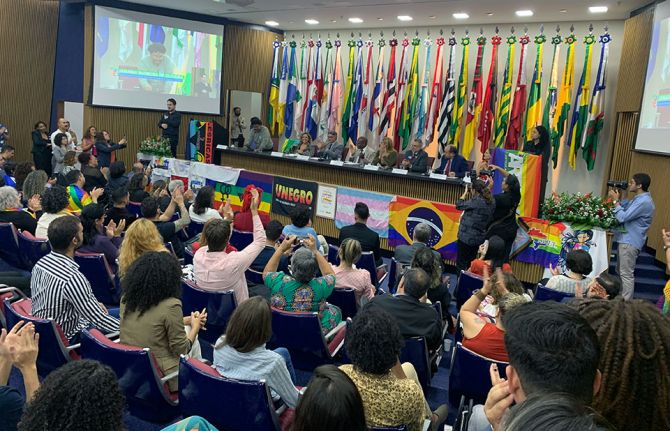

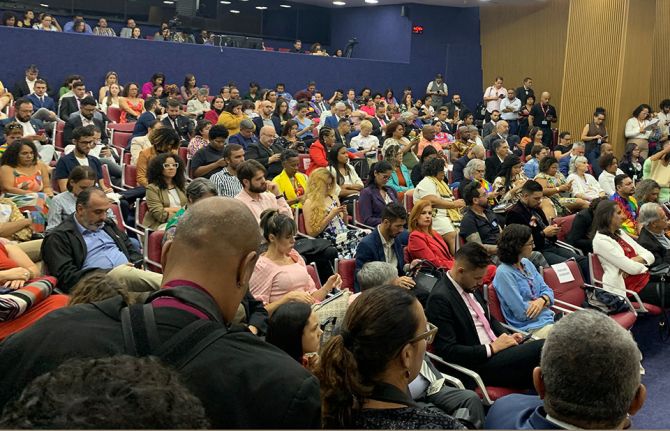
Feature Story
Brazil announces its commitment to the global initiative against HIV-related stigma and discrimination
19 May 2023
19 May 2023 19 May 2023Brazil has joined the 34 countries that are part of the Global Partnership to take action to eliminate all forms of HIV-related stigma and discrimination. The country's entry into this group of nations was announced at a celebratory event of the International Day Against Homophobia, Biphobia, and Transphobia, held in Brasilia, Brazil’s capital and organized in partnership by UNAIDS, ILO, and the Ministry of Human Rights and Citizenship.
The Global Partnership is an initiative launched through a call for action from the NGO Delegation to the UNAIDS Programme Coordinating Board (PCB) in 2018 to remove HIV related stigma in six settings: healthcare, justice, community, workplace, educationa and humanitarian. It is co-convened by UNAIDS, UN Women, the United Nations Development Programme (UNDP), the Global Network of People Living with HIV, and the Global Fund to Fight AIDS, Tuberculosis, and Malaria. It is also supported by a technical working group composed of 10 United Nations agencies and 24 partners and civil society organizations.
With Brazil, now 35 countries have formally joined the Global Partnership, committing to act against HIV-related stigma and discrimination in the contexts of healthcare services, educational settings, workplaces, justice systems, domestic and community environments, emergency systems, and humanitarian crises.
According to Luisa Cabal, the Regional Director of UNAIDS in Latin America, Brazil's entry into the Global Partnership is a significant step in the collective response against HIV-related stigma and discrimination in Latin America and the world. "By joining this initiative, Brazil reaffirms its commitment to defending human rights, promoting social inclusion, and eliminating barriers to access prevention, diagnosis, treatment, and ongoing response to HIV," she explains.
By joining the Global Partnership, Brazil will have access to a platform that will allow the country to share experiences and best practices with the other participating countries, creating opportunities for collective learning, strengthening the joint response to HIV-related stigma and discrimination.
"It is important to highlight that by joining the Global Partnership, Brazil will also reinforce its leadership role in the region and global diplomacy for health and human rights, demonstrating its commitment to equity and social justice," emphasizes Luisa Cabal.
It is indeed a precedent for the GP that commitment to join the Global Partnership has been witnessed by two Ministers.
Minister of Human Rights and Citizenship Silvio Almeida reiterated his unrestricted support and commitment to public policies promoting and protecting the rights of LGBTQIA+ people. ”For those who suffer violence, and are killed simply for being who they are, these people will be protected in a public commitment, and I renew this commitment not only as Silvio Almeida, but as Minister of State for Human Rights of Brazil” emphasized H.E.
Representing the Ministry of Health Helvécio Miranda, Secretary of Specialized Health Care, similarly shared the Ministry's commitment to embrace the agenda of LGBTQIA+ rights and ensure comprehensive healthcare access for all people emphasizing on a gender approach, and with a special focus on those at risk, with specific needs, or experiencing different forms of violence.
Vinícius Pinheiro, Director for Brazil at ILO, embraced the significance of the Global Partnership in promoting social justice and decent work with inclusion and opportunities for all people so that no one is left behind.
Region/country
Related

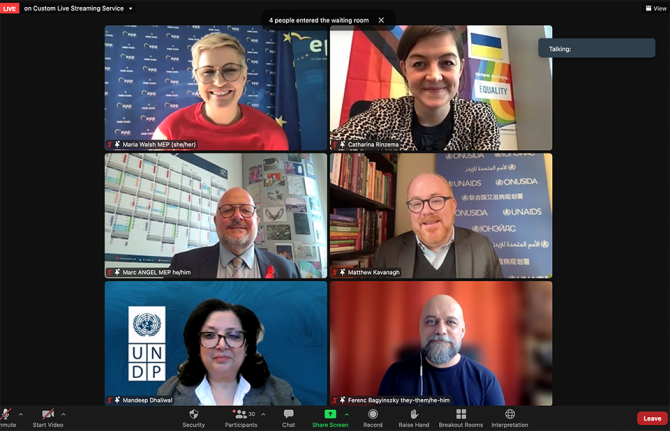
Feature Story
Engaging the EU in the Global Partnership on Zero Discrimination Day
03 March 2022
03 March 2022 03 March 2022On 1 March, Marc Angel, a Member of the European Parliament and former champion for the 90–90–90 HIV targets, hosted a virtual Zero Discrimination Day parliamentary event. The event, co-organized by the Global Partnership for Action to Eliminate all Forms of HIV-Related Stigma and Discrimination (Global Partnership), brought together high-level speakers who are passionate about ending discrimination in the European Union (EU) and beyond.
The speakers addressed HIV-related rights violations, societal barriers, including laws and policies, and the underlying stigma and discrimination that fuels the AIDS pandemic. Reflecting on their own work and experiences, they discussed how the EU and its member states could advance the work of the Global Partnership in ending discriminatory laws, policies and practices within the EU region and partner countries.
“Stigma and discrimination hurt the fight against HIV/AIDS, as they constitute a major obstacle to seeking testing and accessing or staying on treatment,” said Helena Dalli, the EU Commissioner for Equality. “We can, and must, combat HIV stigma and discrimination, speak up, collect evidence and share facts and knowledge.”
Evidence gathered by community networks and civil society organizations reveals significant levels of stigma and discrimination and other human rights violations that impact people living with and affected by HIV in the EU, which has been exacerbated by the COVID-19 pandemic.
“When it comes to the EU, there are still growing inequalities, which are major barriers in the HIV response,” said Ferenc Bagyinszky, the Executive Coordinator of AIDS Action Europe. “The global AIDS strategy gives an excellent opportunity for the EU and its member states, together with the communities, to work towards ending these inequalities in the EU, especially in relation to the 10–10–10 targets.”
“The EU can make a critical contribution to address HIV-related stigma and discrimination by establishing linkages with its various human rights and gender equality projects,” said Mandeep Dhaliwal, Director of the HIV, Health and Development Group of the United Nations Development Programme.
“By leveraging its expertise, resources and political leadership to support communities and partner countries in ending HIV-related stigma and discrimination wherever it exists, the EU can make a huge contribution to getting the HIV response back on track,” said Matthew Kavanagh, UNAIDS Deputy Executive Director, a.i., Policy, Advocacy and Knowledge.
To date, 29 countries, none of which are EU member states, have joined the Global Partnership.
Luxembourg’s Minister for Development and Humanitarian Affairs, Franz Fayot, announced Luxembourg’s support for the Global Partnership, the first EU member state to do so. “We support the work of the Global Partnership and can only applaud its role in assisting countries in achieving the 10–10–10 targets by removing laws that harm and creating laws that empower. The Global Partnership’s strategic approach and inclusive platform to manage the diverse human rights violations faced by people living with HIV and marginalized populations will be key to addressing counterproductive discriminatory practices,” Mr Fayot said.
“The Global Partnership is a unique opportunity for the EU and its member states to end intersecting inequalities and injustices for a pandemic-resilient Europe and the world,” said Mr Angel.
Catharina Rinzema, a Member of the European Parliament, spoke about the importance of talking about HIV openly, to correct misconceptions and help the public to educate themselves. She also alluded to the stigma and discrimination that lesbian, gay, bisexual, transgender and intersex people face in the EU. “We should have a blood donation policy where it doesn’t matter with whom you have sex, but whether the sex was safe,” she said.
Maria Walsh, a Member of the European Parliament, referred to the effects that stigma and discrimination has on the mental health and well-being of people living with HIV and called for an inclusive and comprehensive EU mental health strategy. “In order to break the stigma and empower HIV-positive people, it is essential that we speak openly and honestly about their lived experience,” she said.
Mr Angel concluded by encouraging EU member states to join the Global Partnership and highlighted the need for global and concerted action to meaningfully advance towards ending HIV-related stigma, discrimination, inequalities and AIDS by 2030.
Related

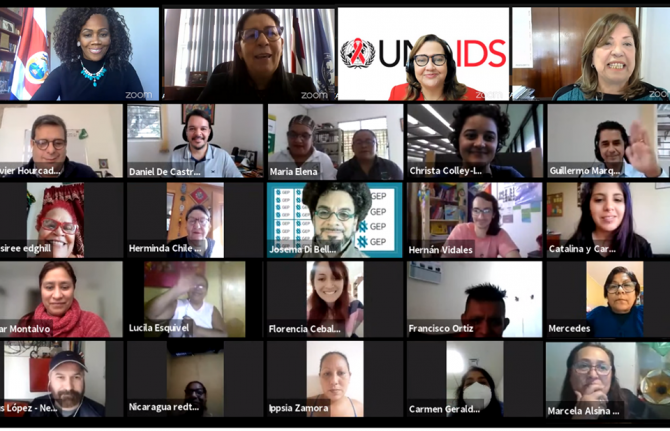
Feature Story
Costa Rica joins Global Partnership for Action to Eliminate all Forms of HIV-Related Stigma and Discrimination
07 June 2021
07 June 2021 07 June 2021Costa Rica has joined the Global Partnership for Action to Eliminate all Forms of HIV-Related Stigma and Discrimination. At a United Nations High-Level Meeting on AIDS side event on 7 June, the Vice President of Costa Rica, Epsy Campbell Barr, emphasized the country’s commitment to human rights by highlighting that a comprehensive and effective HIV response needs to include the human rights of people living with HIV.
Costa Rica is the third signatory to the global partnership in the Latin America and Caribbean region, joining Jamaica and Argentina.
The side event, Latin America and the Caribbean on the Road to Eliminating HIV-Related Stigma and Discrimination, was co-organized by the regional coordinator of the global partnership, RedTraSex (the Sex Workers Network for Latin America and the Caribbean), the Global Network of People Living with HIV and the Governments of Jamaica and Costa Rica, with the support of UNAIDS.
Five year ago, the 2016 United Nations Political Declaration on Ending AIDS recognized the HIV epidemic as a human rights challenge. Member States expressed concern about HIV-related stigma and discrimination around the world and about the regulatory and legal frameworks that discourage and prevent people from accessing HIV-related services.
The Global Partnership for Action to Eliminate all Forms of HIV-Related Stigma and Discrimination was created in 2017. The initiative has the goal of catalysing and accelerating the implementation of commitments made to end HIV-related stigma and discrimination by United Nations Member States, United Nations agencies, bilateral and international donors, nongovernmental organizations and communities.
Countries have made commitments on ending discrimination in various international conventions, and have made further promises at the regional and national levels. The global partnership supports countries in transforming those promises into reality through policies, programmes and practices that strengthen health and HIV-related rights.
Through the regional coordination of RedTraSex, the global partnership supports an open and ongoing dialogue in the regional civil society networks with the goal of strengthening national coordination platforms and representation, with a focus on people living with, at risk of or affected by HIV.
Quotes
“We understand that eliminating stigma and discrimination is a fundamental part for us to make society aware of the impacts of HIV and to have a permanent drive that allows us prevention and equal access to all services. Eliminating stigma and discrimination means guaranteeing the rights of all people.”
“Today I am deeply moved because 30 years ago I started my activism and I never thought I would be in a panel with such women—because that also makes me deeply proud as a feminist—starting this great revolution together. We need to be considered as a subject of law and not only as an object of research.”
“The new global AIDS strategy provides guidance on the focus we must have: ending inequalities. And to do that, we need to identify the drivers of those inequalities, and stigma and discrimination are among them.”
Region/country

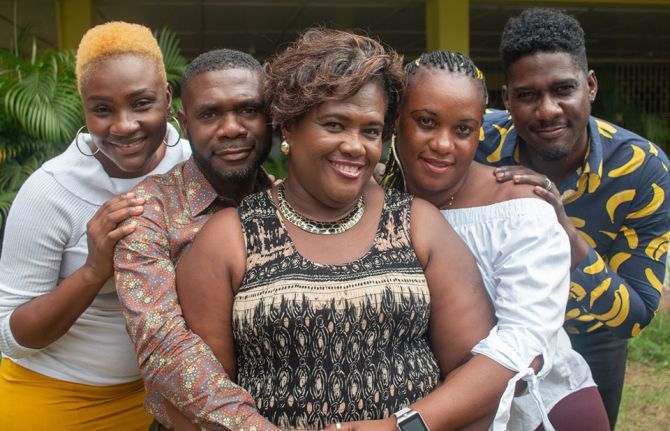


Feature Story
Jamaica partnership works to promote human rights
07 June 2021
07 June 2021 07 June 2021HIV outcomes rely on far more than the availability of services or treatment.
According to the 2020 Jamaica People Living with HIV Stigma Index, more than one third (38%) of respondents delayed HIV testing due to fears about how others would respond if they received a positive diagnosis. And 30% were slow to start treatment because of concerns that people might learn about their status.
Many of those fears are founded.
Almost half of the study’s respondents (48%) had experienced stigma or discrimination related to their HIV status. Members of key population communities reported even higher rates of prejudice and worse mental health than other people living with HIV.
“More needs to be done to get those living with HIV, and communities impacted by HIV, to live in a country and society where they are accepted and appreciated. That will also make their health outcomes better,” said Jumoke Patrick, the Executive Director of the Jamaica Network of Seropositives.
To accelerate progress towards that goal, in 2020 Jamaica became one of the first countries to join the Global Partnership for Action to Eliminate all Forms of HIV-Related Stigma and Discrimination. The initiative combines the power of governments, civil society, donors, academia and the United Nations. It reaches beyond the health sector to address ignorance and bias in education, the workplace, the justice system, families and communities.
On 4 June, the Jamaica Partnership to Eliminate HIV-Related Stigma and Discrimination launched its first annual report, Enabling environment and human rights.
The State Minister in the Health and Wellness Ministry and Chair of the Partnership, Juliet Cuthbert Flynn, reiterated the government’s commitment to addressing the social and legal issues that are barriers to an effective HIV response. She called for political leadership across party lines to recognize their role in helping to create an enabling environment.
“This is an imperative as we strive to allow every individual—regardless of their occupation, socioeconomic status, sexual orientation, gender identity, age, health status, disability and other status—to enjoy their human rights,” Ms Cuthbert Flynn said.
“We strongly believe that AIDS in Jamaica is not over, but it can be,” said the UNAIDS Country Director for Jamaica, Manoela Manova,
She noted that the new UNAIDS report, Global commitments, local action, showed that while dozens of countries had achieved the 2020 targets, many, including Jamaica, are entirely off track.
“HIV remains driven by inequality. The countries with progressive laws and policies as well as strong and inclusive community and health systems have the best outcomes. New HIV infections and AIDS-related deaths reduce faster. That is what we would like to achieve for Jamaica,” Ms Manova said.
Jaevion Nelson, a UNAIDS consultant, detailed the achievements of stakeholders in the national HIV response in Jamaica. A national human rights public education campaign was led by the National Family Planning Board. Sensitization exercises were conducted with police and correctional officers, health-care workers and faith leaders and congregants. People living with HIV received legal support, with several securing resolutions such as being reinstated in their jobs and receiving settlement costs. A National Transgender Health Strategy was launched, and nongovernmental organizations collaborated to develop model antidiscrimination legislation.
The next steps for the initiative include strengthening monitoring, evaluation and learning for its human rights agenda, increasing the engagement of legislators and creating a more sustainable framework for sensitizing health-care workers, law enforcement officers and other duty-bearers.
The UNAIDS Deputy Executive Director, Programme, Shannon Hader, delivered the feature address at the virtual event. “Societal enablers and HIV outcomes are linked,” she said. “We will only end AIDS if we strive to respect, protect and promote the rights of everyone, everywhere. It is the evidence-based thing to do.”

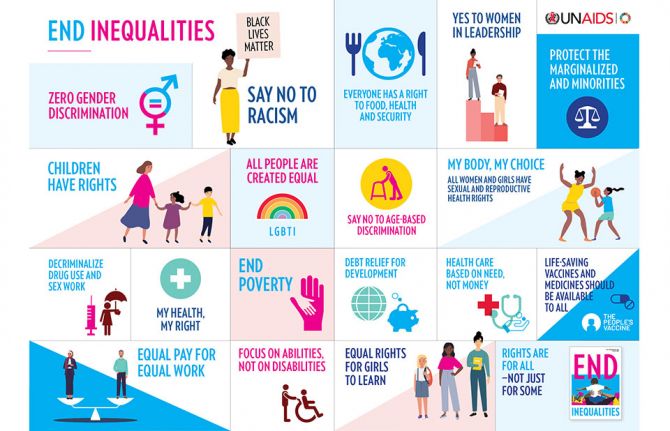
Feature Story
Global Partnership members commemorate Zero Discrimination Day around the world
17 March 2021
17 March 2021 17 March 2021On Zero Discrimination Day this year, governments, civil society organizations and communities highlighted the urgent need to take action to end the inequalities that continue to persist around the world.
Among them were several countries and partners of the Global Partnership for Action to Eliminate all Forms of HIV-Related Stigma and Discrimination (Global Partnership) that commemorated the day by organizing webinars, launching initiatives to accelerate the implementation of commitments to end HIV-related stigma and discrimination or raising awareness about the imperative need to achieve dignity for all.
At the global level, the Global Network of People Living with HIV (GNP+) launched #MoreThan, a global online campaign to celebrate and showcase the diversity of the lives, achievements, interests and dreams of people living with and affected by HIV. And UNAIDS, the United States President’s Emergency Plan for AIDS Relief and the Global Fund to Fight AIDS, Tuberculosis and Malaria organized a webinar to showcase the potential of evidence-informed programmes as well as community-led responses to end HIV-related stigma and discrimination. The event used best practices from countries as diverse as the Democratic Republic of the Congo, Jamaica and Ukraine.
At the country and regional levels, Zero Discrimination Day was marked by a number of initiatives. For example, in western and central Africa, Senegalese artist Coumba Gawlo launched a single to raise awareness of and promote action to respond to HIV in the region, together with fellow artists Wally Seck (Senegal), Djelly Mady Kouyate (Gambia) and Nestor Lendjy (Guinea Bissau).
In Senegal, the Network of People Living with HIV (RNP+) held a dialogue to raise awareness on the impact of HIV-related stigma on women and girls. The dialogue brought together people living with HIV and representatives of women’s movements, key populations, human rights advocates, policymakers and health service providers. The outcomes of the dialogue will be used to inform the advocacy strategy that RNP+ will develop on human rights and gender issues to better respond to the expectations of its members and communities affected by HIV.
Evidence shows that in Senegal women living with HIV face obstacles in accessing reproductive health services, that sex workers face high levels of stigma in health-care settings and that the economic and social vulnerability of women living with HIV is not sufficiently considered in HIV programming. “Discrimination continues to affect women and girls and this is the reason why they are often excluded from the labour market, are isolated in their communities or experience stigma in health centres. Key populations are also historically the target of discrimination in Senegal,” said Soukèye Ndiaye, President of RNP+.
In Côte d’Ivoire, UNAIDS, in collaboration with the Programme National de Lutte contre le Sida, the Alliance Côte d’Ivoire, Enda Santé Côte d’Ivoire and Ligue Ivoirienne des Droits de l’Homme, presented the Global Partnership and its added value to representatives of the Ministry of Health and the Ministry of justice, as well as to civil society partners. The meeting led to a report that will inform Côte d’Ivoire’s strategy to eliminate stigma and discrimination.
In the Central African Republic, which was the first country to join the Global Partnership, the Minister of Health and Population, Pierre Somse, above, issued a declaration recalling the government’s commitment to non-discrimination and equality. “It is only by addressing inequalities that we can achieve the Sustainable Development Goals, including those related to well-being and health for all,” said Mr Somse.
Other events in the Central African Republic included a civil society consultation to identify priorities for eliminating stigma and discrimination and a round-table discussion on a radio show to highlight that stigma and discrimination is a barrier to people taking up HIV prevention, treatment, care and support services. Dedicated trainings on the National Charter for Quality of Care and Patients’ Rights took place for medical staff in two major health-care centres in Bangui. In the Central African Republic, more than 80% of people living with HIV in the country have reported experiencing discrimination or stigma.
In the Islamic Republic of Iran, the country’s new anti-discrimination regulation was disseminated on social media to mark Zero Discrimination Day. In Thailand, UNAIDS, the Ministry of Foreign Affairs and the Ministry of Public Health cosponsored a panel discussion on the Global Partnership to showcase the power of governments, civil society and the United Nations to tackle HIV-related stigma and discrimination in Asia and the Pacific. And in the Republic of Moldova, an updated road map was developed to address the remaining barriers related to stigma and discrimination, gender mainstreaming and equality, considering the commitments made under the National AIDS Program and the Global Partnership.
Finally, on the eve of Zero Discrimination Day, Kazakhstan officially joined the Global Partnership. For Baurzhan Baiserkin, the Director of the Kazakh Scientific Center for Dermatology and Infectious Diseases of the Ministry of Health of Kazakhstan, the initiative will make a positive difference for people living with HIV, prisoners, migrants and other key populations.
“Kazakhstan supports the Global Partnership initiative to eliminate all forms of HIV-related stigma and discrimination. I am confident that it will help to achieve the Sustainable Development Goals,” said Mr Baiserkin.
The Global Partnership for Action to Eliminate All Forms of HIV-Related Stigma and Discrimination is an initiative whose goal is to catalyse and accelerate the implementation of commitments made to end HIV-related stigma and discrimination by United Nations Member States, United Nations agencies, bilateral and international donors, nongovernmental organizations and communities.
Related

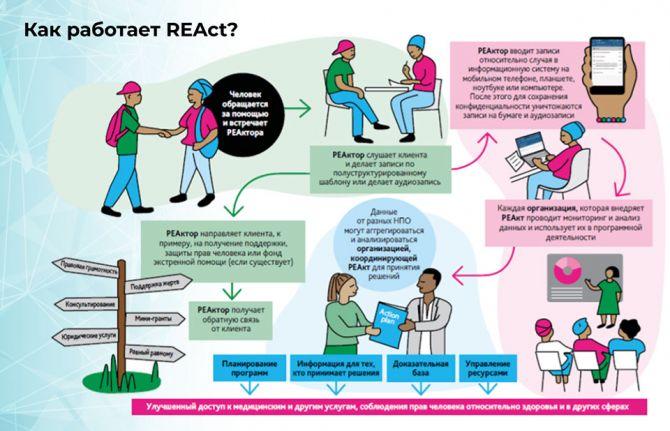
Feature Story
Towards 10–10–10 in eastern Europe and central Asia
15 March 2021
15 March 2021 15 March 2021The recent regional launch of the global AIDS report 2020, Prevailing against pandemics by putting people at the centre, in eastern Europe and central Asia provided a platform for the proposal of a joint revision of social and legal enablers in the region to achieve the proposed 2025 targets. UNAIDS Cosponsors, governments and civil society partners presented their views on the issue and the joint action to be taken.
Based on the regional data, the 90–90–90 treatment cascade in the region is far off the targets, having reached only 70–44–41. Lev Zohrabyan, the UNAIDS Strategic Information Adviser for Eastern Europe and Central Asia, noted that one of the reasons for this is late diagnosis: in 2019, 53% of all new HIV cases in the region were registered in the later stages. In his opinion, it shows that testing strategies need revision and require enabling societal conditions.
Societal and service enablers have been given prominence in the proposed 2025 targets; in particular, it is outlined in the 10–10–10 targets that:
- Less than 10% of countries have punitive legal and policy environments that deny access to justice.
- Less than 10% of people living with HIV and key populations experience stigma and discrimination.
- Less than 10% of women, girls, people living with HIV and key populations experience gender inequality and violence.
Achieving these goals includes having enabling laws, policies and public education campaigns that dispel the stigma and discrimination that still surrounds HIV, empower women and girls to claim their sexual and reproductive health and rights and end the marginalization of people at higher risk of HIV infection.
“Interventions in these areas create conditions for people to be more active in HIV testing, seek help and start antiretroviral therapy immediately upon diagnosis, adhere to a treatment regimen or proactively seek HIV prevention services, including pre-exposure prophylaxis,” said Mr Zohrabyan.
Rosemary Kumwenda, the Regional HIV/Health Team Leader at the United Nations Development Programme Istanbul Regional Hub, presented an analysis of the legislation in the eastern Europe and central Asia region on the criminalization of HIV and key populations, noting that the situation in the region remains unfavourable for an effective HIV response. The criminal codes have changed in many countries, but discriminatory laws are changing very slowly. Although many countries revisited their legislation regarding HIV exposure, HIV transmission is criminalized in virtually every country in the region. The Russian Federation and Belarus remain “leaders” in the criminalization of HIV and key populations. Criminal penalties for sex between adult men remain in Uzbekistan and Turkmenistan. The biggest challenge for the region, where more than 48% of new HIV cases are among people who inject drugs, is the criminalization of drug use and possession.
In the presentation An Inventory of Existing Tools for Creating a Favourable Social and Legal Environment in the Eastern Europe and Central Asia Region, given by Tatiana Deshko, the Director of the Department of International Programs, ICF Alliance for Public Health, Ukraine, the ReACT mechanism, which comprehensively works for the rights of key populations, was presented. ReACT (Rights, Evidence, Actions) is the programme’s principle for monitoring violations of rights and is being implemented in 37 cities in seven countries of the region with the support of the Global Fund to Fight AIDS, Tuberculosis and Malaria (Global Fund). Cases of rights violation are registered in a mobile application and then lawyers work with specific cases at the individual level or at the system level of revising legislation. Last year, about 2000 cases were registered. The analysis shows that law enforcement agencies are the primary violators of the rights of key populations in almost all countries, using threats, intimidation, illegal detention and abuse of authority. The health-care system, with denials of medical services, discrimination based on HIV status or disclosure of HIV status, is ranked after law enforcement. “Strategic analysis of cases based on the ReACT-collected data allows not only help for specific people to protect their rights but also formulating recommendations for revising legislation in countries,” said Ms Deshko.
As part of the discussion of the second 10, Alexandra Volgina, the Manager of the Global Partnership for Action to Eliminate All Forms of HIV-Related Stigma and Discrimination, Global Network of People Living with HIV, spoke about the People Living with HIV Stigma Index 2.0 study and the role of the Global Partnership for Action to Eliminate All Forms of HIV-Related Stigma and Discrimination.
Four countries of the region, Kazakhstan, Kyrgyzstan, the Republic of Moldova and Ukraine, have entered the Global Partnership for Action to Eliminate All Forms of HIV-Related Stigma and Discrimination. “If we compile the ReACT system, the Stigma Index and other instruments you’ll get a clear picture of what exactly needs to be done to make a difference. We need to address this issue jointly, all partners together. If we change the situation in the area of stigma and discrimination, we will be able to stop the epidemic,” said Ms Volgina.
An example of such an integrated approach, from data to policies and action, was shared by Evghenii A. Golosceapov, a member of the Equality Council in the Republic of Moldova, the first state institution in the post-Soviet countries dealing with discrimination against various groups.
As part of the Equality Council’s work, studies on the People Living with HIV Stigma Index were carried out, where, through public opinion polls and in-depth interviews, categories of people who are marginalized by society were determined. People living with HIV ranked the second among those categories, after lesbian, gay, bisexual, transgender and intersex people. The Equality Council also uses data from the People Living with HIV Stigma Index, the ReACT registration system and research on the legal environment on HIV.
On this comprehensive basis, more than 70 recommendations on practical steps in the field of legislative changes were developed. These data were used to develop a new national HIV programme and a country proposal to the Global Fund. In addition, the Equality Council considers specific cases of discrimination and complaints (e.g. dismissal due to HIV status) and supports civil society organizations in defending the rights in court. In recent years, the restriction on artificial insemination for people living with HIV has been lifted in the Republic of Moldova, as well as the ban on adoption and guardianship.
All the data collected shape the Roadmap for the Elimination of Discrimination, a government programme in which people living with HIV play a critical role. In the Republic of Moldova, the ScorCard system has also been launched, which allows real-time tracking of the implementation of recommendations and progress towards the adopted targets in reducing stigma and discrimination.
Regional gender gaps in the context of the HIV response were presented by Enkhtsetseg Miyegombo, a Programme Specialist at the UN Women Europe and Central Asia Regional Office.
According to her, the COVID-19 pandemic has largely erased progress in this area and exacerbated existing inequalities: lockdowns disproportionately affected the workload of women who do unpaid domestic work, reduced women’s economic opportunities due to job losses, limited their mobility and increased documented violence against women. These new circumstances were superimposed on existing problems—a lack of awareness about HIV, barriers to discussing safer sex with a partner, revival of patriarchal stereotypes, religious restrictions—as a result of which, women find themselves under growing pressure. Ms Miyegombo highlighted that investment in gender equality programmes is critical to the effectiveness of the regional HIV response.
A study conducted by the Eurasian Women’s Network on AIDS helped to identify the key characteristics of violence and the specifics of organizing assistance to victims of violence in 12 countries of the eastern Europe and central Asia region. The results of the study supplemented the available international data on violence and equipped national civil society organizations with real facts for political advocacy. Elena Rastokina, a specialist in advocacy and community mobilization from the Almaty Model of HIV Epidemic Control project in Kazakhstan, presented successful practices of community-based monitoring in the eastern Europe and central Asia region, concluding that this approach is important as it allows communities to know their rights and barriers and to have systematic data to advocate for systematic change.
Alexander Goliusov, the Director, a.i., of the UNAIDS Regional Support Team for Eastern Europe and Central Asia, stressed that the new 10–10–10 targets are addressing the inequalities that are fuelling the spread of HIV, COVID-19 and other pandemics. “Testing and treatment remain our priorities; however, now our fast track to them lies in combatting inequalities,” he said.
The recording of the launch in Russian and English, along with all presentations and materials, can be found here.
Region/country
- Eastern Europe and Central Asia
- Albania
- Armenia
- Azerbaijan
- Belarus
- Bosnia and Herzegovina
- Bulgaria
- Croatia
- Cyprus
- Czechia
- Estonia
- Georgia
- Hungary
- Kazakhstan
- Kyrgyzstan
- Latvia
- Lithuania
- Montenegro
- Poland
- Republic of Moldova
- Romania
- Russian Federation
- Serbia
- Slovakia
- Slovenia
- Tajikistan
- North Macedonia
- Türkiye
- Turkmenistan
- Ukraine
- Uzbekistan
Related

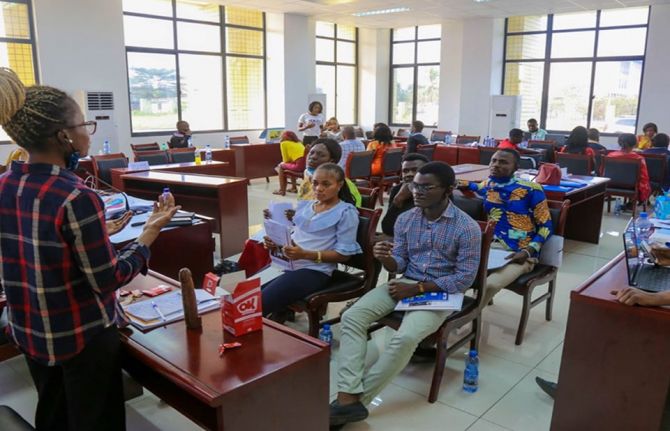
Feature Story
Coalition working to end gender-based sexual violence in Democratic Republic of the Congo
09 March 2021
09 March 2021 09 March 2021The Democratic Republic of the Congo has been plagued by political instability since the 1990s and has seen widespread attacks against civilians, violence between ethnic factions, rape and other forms of sexual violence, and murder. Sexual violence against adolescent girls and young women is common.
Violence against women and girls continues to be a global pandemic that affects one in three women in their life. Violence against women is a major factor for contracting HIV—in areas with a high HIV burden, such as sub-Saharan Africa, women subjected to intimate partner violence are 50% more likely to be living with HIV. And men who are perpetrators of violence against women tend to be at a higher risk of HIV themselves and to use condoms less frequently, thus increasing the risk of HIV transmission.
According to the latest Demographic and Health Survey of the Democratic Republic of the Congo, HIV prevalence is three times higher among women aged 15–49 years (1.1%) than among men of the same age (0.4%) and twice as high among young women aged 15–24 years (0.46%) than among young men of the same age (0.22%).
RENADEF (Réseau National des ONG pour le Développement de la Femme), a platform of approximately 350 non-state groups working for women, is tackling this issue front and centre. As a subrecipient of a grant from the Global Fund to Fight AIDS, Tuberculosis and Malaria, RENADEF is running a project to strengthen awareness around sexual and reproductive health and rights, including HIV, to facilitate access to support services and to encourage behaviour change among adolescent girls and young women in 16 HIV high-burden provincial divisions.
In collaboration with health-care providers, almost 200 peer educators and mentors have been trained on sexual and reproductive health and more than 600 educational talks in different settings, including schools and communities, have been facilitated, reaching more than 6500 people, including 2500 girls.
“I was not informed about sexually transmitted infections and their consequences on my life, but I had the chance to participate in an awareness session organized by the peer educators and mentors in my neighbourhood; at the end of the session, I approached one of the sensitizers to explain my problem to her. She gave me advice and referred me to a health training, where I was taken care of for free and I feel good now,” said Nathalie Nyembwe (not her real name), who attended one of the educational talks.
The project also supports clinics giving psychosocial, legal and judicial support to survivors of sexual violence. Since 2018, clinics have been held that have provided psychological support to almost 5500 people and legal/judicial support to more than 3500 survivors of sexual violence.
The community sensitization, capacity-building of legal clinics and support for survivors of sexual violence have contributed to an increase in the reporting of rape.
“It’s particularly important, particularly as we reflect on our experience with COVID-19, that we acknowledge the important role that women have played to protect others from violence, to ensure continued support to vulnerable families and to ensure access to food and medicine. Women have provided invaluable support to keep people connected to neighbours, services and information, all the while ensuring that homes remain a safe space for children and families to continue to learn and grow socially,” said Susan Kasedde, the UNAIDS Country Director for the Democratic Republic of the Congo.
As a champion country of the Global Partnership for Action to Eliminate all Forms of HIV-Related Discrimination, the Democratic Republic of the Congo has a unique opportunity to strengthen its implementation of coordinated, comprehensive and scaled-up action involving a range of stakeholders and to build synergies on action on gender equality across sectors.

